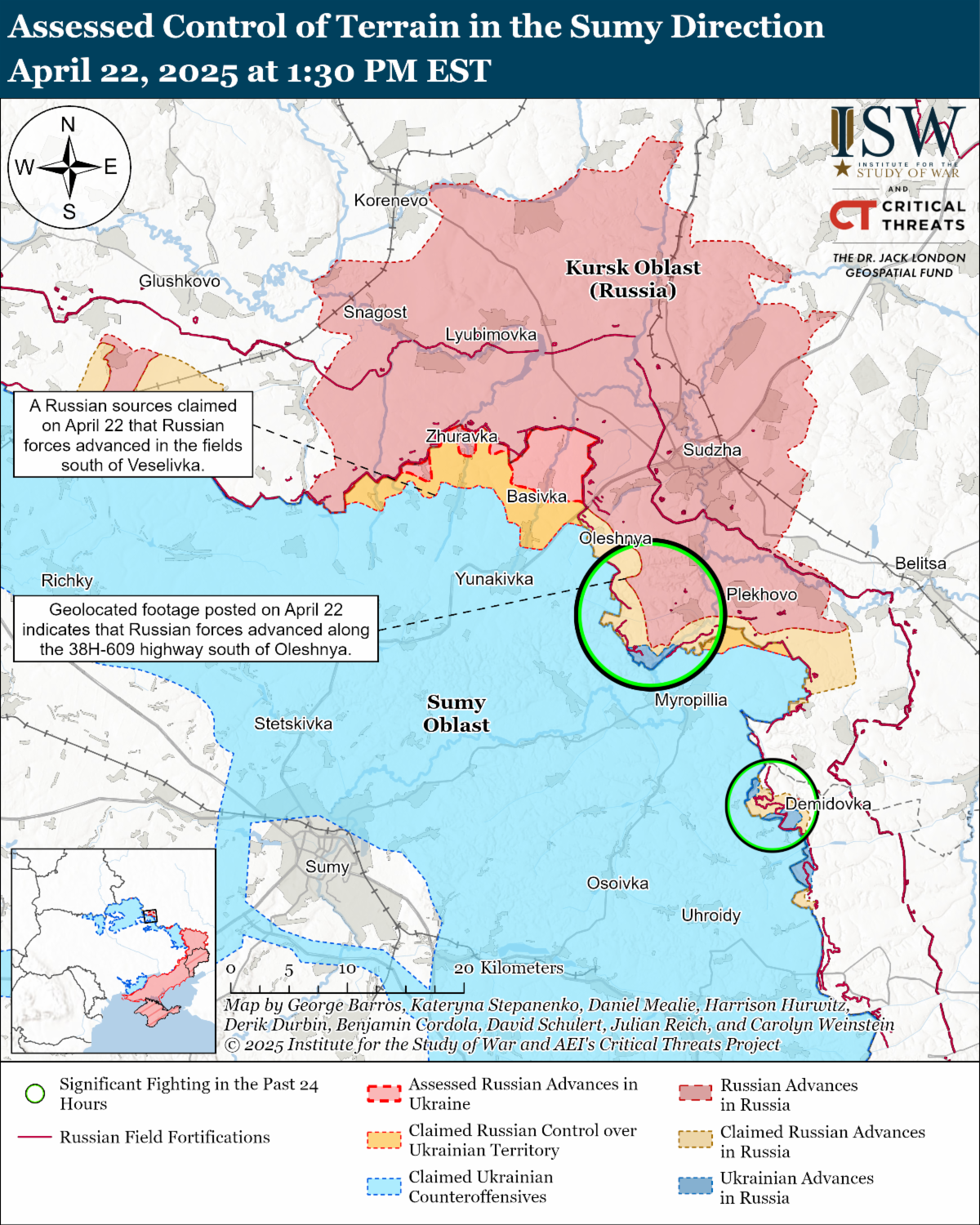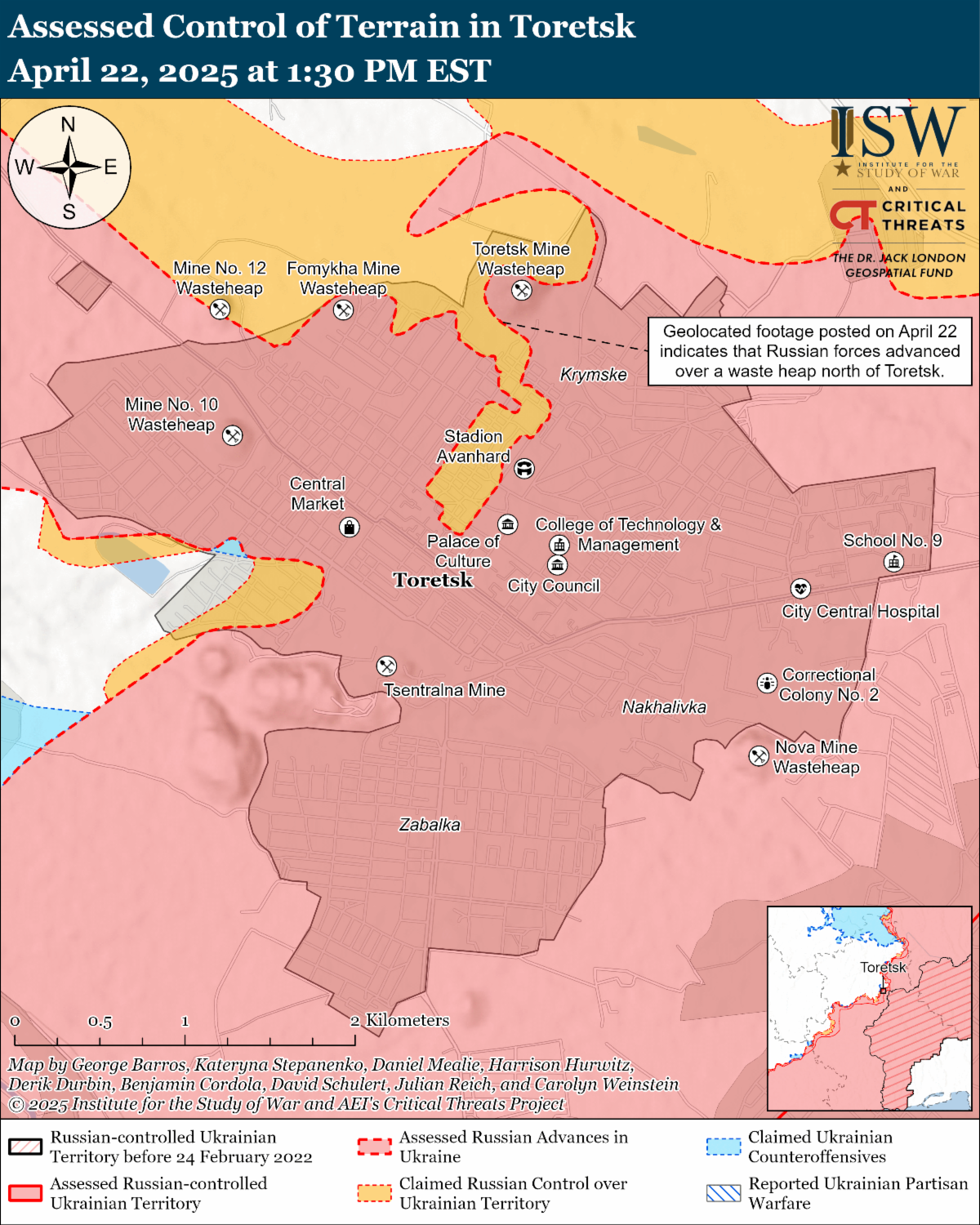The Financial Times (FT) reported that Russian President Vladimir Putin is willing to end the war in Ukraine on the current frontlines. Kremlin officials, including Putin, have repeatedly and explicitly emphasized that Russia maintains its territorial demands over all of Donetsk, Luhansk, Zaporizhia, and Kherson oblasts, however, while also publicly signaling that Russia has greater territorial ambitions in Ukraine beyond these four oblasts. The FT reported on April 22 that sources familiar with the matter stated that Putin told US Special Envoy for the Middle East Steve Witkoff during their April 11 meeting that Russia could relinquish its claims to the Ukrainian-controlled parts of the four oblasts that Russia has formally laid claim to and illegally annexed. European officials briefed on the US efforts to end the war stated that Putin would probably use this to lure US President Donald Trump into accepting Russia's other demands and force these demands onto Ukraine as a fait accompli. Russia's "other demands" referenced by FT likely include Russia’s public demands for Ukrainian neutrality, regime change, and demilitarization — Putin's pre-war demands that Kremlin officials have consistently reiterated throughout the war and during negotiations about possible ceasefires and a peace deal.
Russian officials have recently repeated Putin's June 2024 demand that Ukraine cede all of Luhansk, Donetsk, Zaporizhia, and Kherson oblasts before Russia can agree to a ceasefire and peace negotiations. Russian Foreign Minister Sergei Lavrov explicitly cited Putin's June 2024 speech on April 14, and Russian Foreign Intelligence Service (SVR) Head Sergey Naryshkin claimed on April 15 that any future peace agreement must include the recognition of Russia's illegal annexation of the entirety of these four oblasts. Russia passed constitutional amendments in October 2022 that defined the four oblasts as Russian territory, and Russian officials have recently reiterated how the Russian Constitution holds primacy over international law. Russian officials have also repeatedly invoked the term "Novorossiya" when talking about Russian-occupied and Russian-claimed territory in southern Ukraine, with Putin most recently using the term on April 21. Novorossiya is an invented region in Ukraine that Kremlin officials have claimed includes all of southern and eastern Ukraine and is an "integral" part of Russia. A senior Russian occupation official, recently on April 21, called for Russia to control areas of southern Ukraine near the Dnipro River, including territory in oblasts that Russia has not formally claimed or illegally annexed. Russian officials. including Putin, have also labelled Odesa City a "Russian city" that has nothing to do with Ukraine." Kremlin newswire TASS has notably begun, as of April 2025, to characterize any Kremlin statements about Russian-claimed territory in Ukraine as about "Donbas and Novorossiya," likely as part of Kremlin efforts to set conditions for Russian society to expect Russia to achieve extensive territorial concessions in Ukraine.
The Moscow Times reported that the Kremlin is attempting to use economic incentives to sway US-Russian talks about the war in Ukraine, as the Kremlin is not sincerely interested in US President Donald Trump's efforts to end the war. ISW cannot independently verify Kremlin sources' statements, but recent Kremlin behavior is consistent with the Moscow Times' insider reporting. Independent Russian outlet the Moscow Times reported on April 21 that five current Russian government officials, including two diplomats and three sources close to the Kremlin who are employees of three major state-owned companies, stated that the Kremlin is looking for incentives to "hold...Trump's attention." One current Russian government official stated that Russian authorities are working "in full swing" to prepare proposals for Trump across "key economic sectors." One source who has participated in the Kremlin discussions on the matter stated that Russia "needs to milk Trump as much as possible, dangling the possibility of a ceasefire like a carrot before him." A Russian diplomat stated that the Kremlin's priority is to "recalibrate" relations with the United States while keeping dialogue about the war in Ukraine "alive." The Moscow Times reported that the official Russian sources see two main scenarios that could unfold: either Russia agrees to a Trump-brokered ceasefire in exchange for concessions, such as limitations on US weapons supplies to Ukraine, or Russia will blame Ukraine should talks collapse.
Russia has recently offered the United States economic incentives that are unrelated to Russia’s war in Ukraine, likely as part of efforts to extract concessions from the United States about Russia’s war in Ukraine. Russian Presidential Aide Nikolai Patrushev, for example, called for the United States and Russia to jointly work to solve problems in the Arctic in an April 21 article in Russian business outlet Kommersant. This Russian effort goes against the Trump administration's desired timeline of events, as the White House has stated that the United States "needs to see a ceasefire first" before developing US-Russian economic partnerships. Kremlin officials have claimed that Russia is willing to negotiate to end the war in Ukraine while attempting to blame Ukraine for the lack of progress towards ending the war. Putin, however, has rejected multiple full or temporary ceasefire offers that the United States and Ukraine have proposed. Putin rejected the March 18 US-Ukrainian proposed temporary ceasefire along the entire frontline; refused to extend the unilateral Russian Easter truce on April 21, despite both US and Ukrainian President Volodymyr Zelensky's support for such an extension; and rejected Zelensky's recent proposal for a temporary moratorium on long-range strikes against civilian infrastructure. Putin has already started to question whether Ukraine would be able to receive military aid from its allies in the event of a temporary full ceasefire — possibly to set conditions to demand the cessation of United States and likely also European weapons supplies to Ukraine as a condition for accepting a full ceasefire.
Any potential future Russian agreement to freeze the front short of Russia's full control of Luhansk, Donetsk, Zaporizhia, and Kherson oblasts does not preclude future Russian aggression to achieve Russia's more extensive territorial demands, especially if the agreement stipulates a moratorium on Ukraine receiving Western military aid. A Russian diplomat reportedly told the Moscow Times that "the situation on the ground will dictate the next moves" in US-Russian talks about the war and that "it is all about time, patience, and staying the course." The current frontlines do not provide the strategic depth that Ukraine will need to reliably defend against renewed Russian aggression, as Russian forces are just across the Dnipro River from Kherson City, roughly 25 kilometers from Zaporizhzhia City, and 20 kilometers from Kharkiv City. Russia has notably intensified its use of armored vehicles across the frontline and appears to have started a likely years' long effort to seize Ukraine's fortress belt in Donetsk Oblast - likely as part of efforts to gain as much territory as possible in eastern and southern Ukraine, particularly in the four oblasts to which Russia has formally laid claim. Russia may tactically and temporarily stop pushing for Putin's demands for the Ukrainian-controlled areas of the four illegally annexed oblasts in southern and eastern Ukraine in order to extract other concessions from the United States under the rubric of negotiations. Such concessions could be Russia's "other demands" of installing a pro-Russian government in Kyiv and drastically shrinking the Ukrainian military in order to decrease resistance against renewed Russian aggression. The Kremlin will likely exploit any ceasefire predicated on limitations on US weapons supplies to Ukraine to prepare for renewed aggression.
Key Takeaways:
- The Financial Times (FT) reported that Russian President Vladimir Putin is willing to end the war in Ukraine on the current frontlines. Kremlin officials, including Putin, have repeatedly and explicitly emphasized that Russia maintains its territorial demands over all of Donetsk, Luhansk, Zaporizhia, and Kherson oblasts, however, while also publicly signaling that Russia has greater territorial ambitions in Ukraine beyond these four oblasts.
- The Moscow Times reported that the Kremlin is attempting to use economic incentives to sway US-Russian talks about the war in Ukraine as the Kremlin is not sincerely interested in US President Donald Trump's efforts to end the war. ISW cannot independently verify Kremlin sources' statements, but recent Kremlin behavior is consistent with the Moscow Times' insider reporting.
- Any potential future Russian agreement to freeze the front short of Russia's full control of Luhansk, Donetsk, Zaporizhia, and Kherson oblasts does not preclude future Russian aggression to achieve Russia's more extensive territorial demands, especially if the agreement stipulates a moratorium on Ukraine receiving Western military aid.
- Kremlin officials continued efforts on April 22 to blame Ukraine for the lack of progress towards Ukrainian President Volodymyr Zelensky's proposed temporary ceasefire on strikes against civilian infrastructure.
- The Kremlin continues to reject Trump's stated goal of achieving a ceasefire in Ukraine before a full peace settlement to end the war – in contrast to Ukraine's continued support for a general ceasefire.
- Russian forces continue to innovate their long-range drone strike tactics in order to offset the effectiveness of Ukrainian mobile defense units.
- Russia is reportedly recruiting North Korean citizens to compensate for labor shortages in Russia, indicating that Russian-North Korean cooperation continues to deepen.
- Russian forces recently advanced in Kursk Oblast and near Toretsk.
|






 [ISW] 러시아군 생성 및 기술 적응 업데이트 2025년 4월 23일
[ISW] 러시아군 생성 및 기술 적응 업데이트 2025년 4월 23일
 [ISW] 이란 업데이트, 2025년 4월 22일
[ISW] 이란 업데이트, 2025년 4월 22일